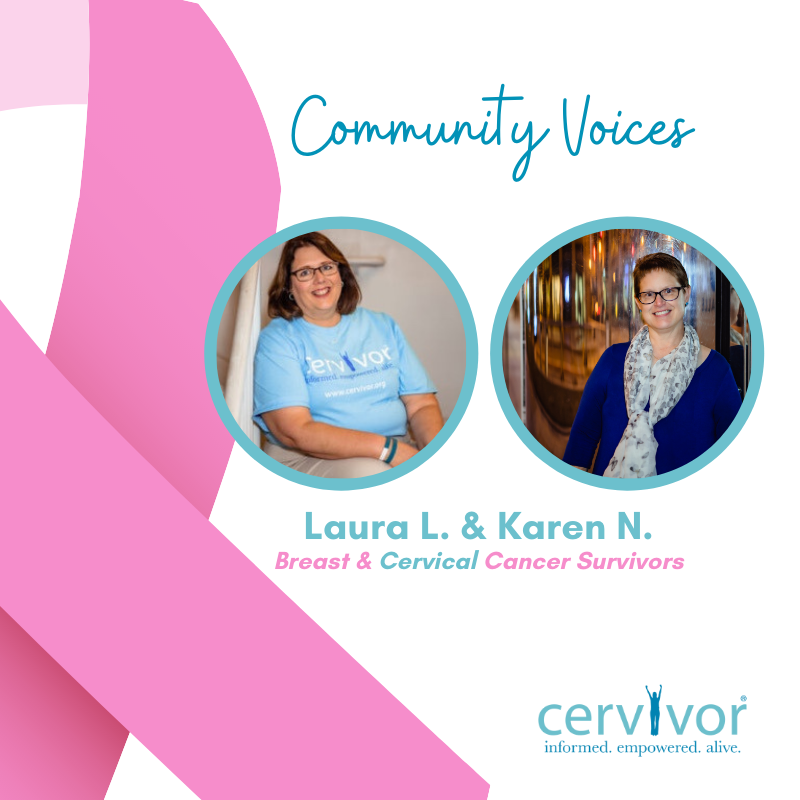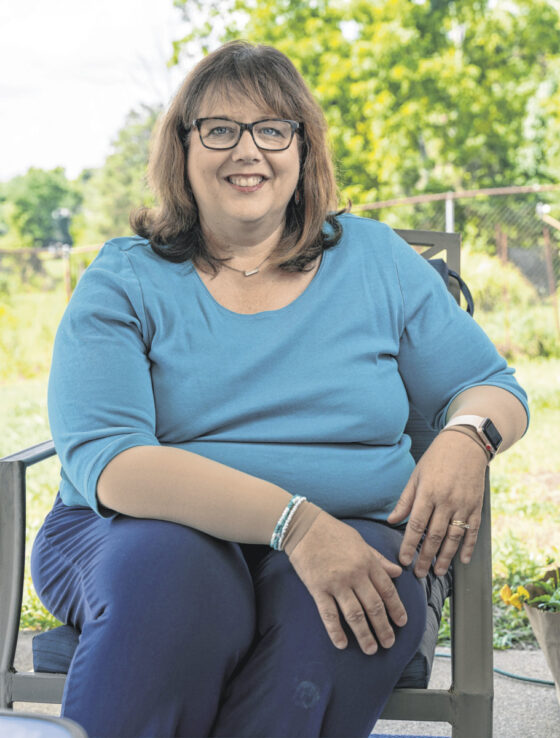1 in 8 women are diagnosed with breast cancer in their lifetime and it remains to be the most common cancer amongst women in the U.S. The death rates from breast cancer have reduced due to advancements in technology and routine breast cancer screenings.
It is estimated that about 14,480 new invasive cases of cervical cancer will be diagnosed in 2021. Cervical cancer was once the most common cancer death amongst women in the U.S. Cancer death rates were reduced significantly with the use of a screening tool to detect changes in the cervix, also known as the Pap test.
Early detection and screening has saved so many of us. Can you imagine making it through one cancer diagnosis only to be given another and a different type at that? Hear from two of our Cervivor community members in their experiences with both breast and cervical cancer.

Laura shares her thoughts as a breast and cervical cancer survivor
After treatment, Laura was trying to find other advocates and advocacy resources for cervical cancer patients. She noticed there was a difference in how the treatments were carried out and in the kind of support she received between the two cancers.
“I first encountered cancer in the form of cervical cancer. The treatments were isolating, there was a lack of resources, and there was a stigma that left me feeling ashamed and not understanding why. Two years later, I was diagnosed with breast cancer. I experienced a complete 180, the treatments took place in a communal setting, pink support was everywhere, and there was no feeling of shame.”
Laura wanted to understand what she could do to help gynecologic cancer patients, specifically cervical cancer patients. She was drawn to Cervivor School as a way to dive in with trusted resources and what she found, in addition, was a sisterhood and a way to network with community partners. Since Laura attended Cervivor School Chicago in 2019, she has built community partnerships like the one with her local American Cancer Society Cancer Action Network (ACSCAN).
“My plea to everyone is to not let any screening lapse – cervical, breast, skin, colon, etc. Don’t let your guard down against cancer of any type!”
Read Laura’s Cervivor story here, then read her interview with the Daily Journal.

Karen, a former nurse, and breast cancer survivor gives helpful tips on navigating a diagnosis
Karen was well aware of the pink ribbon after her experience with breast cancer. She found herself asking what ribbon color represented cervical cancer after her diagnosis in 2015.
Karen recommends these helpful tips on navigating a cancer diagnosis:
- First, don’t Google it. This can put you in a negative headspace right off the bat.
- Get to know all of the key care team members taking care of you.
- Bring a family member or friend to all of your appointments as a second set of ears. If you are not able to have someone with you due to unforeseen circumstances, ask your care team if it is okay to record your visit with your smart phone.
- Bring a notebook and keep a running list of questions you may want to ask your care team between visits. This also comes in handy to keep track of side effects, medications, etc.
- Don’t be afraid to ask for help!
She expresses additional things that helped her during her cancer treatment, “I went to physical therapy to regain mobility, I reached out for support to other friends that had had breast cancer – like my friend that lives in Australia. She and I would text on those nights I couldn’t sleep. I decided to see a counselor in conjunction with my psychiatrist to work through the emotional turmoil I was experiencing. With breast cancer, I didn’t feel abandoned by my friends but when I had cervical cancer, it felt different. Lastly, I continued going to my favorite place at the lake so I could connect with nature’s beauty. It really brought some peace into my life.”
Read Karen’s Cervivor story here then read her blog post “On Wednesdays we wear Pink”… wait, what?.

If you’re reading this today and you haven’t scheduled your routine cancer screenings, pick up your phone or go online and schedule them now! Screening and early detection saves lives.
Screening guidelines change often with the advancement of technology. If you’re unsure of your screening guidelines, go here for breast cancer and here for cervical cancer.
Are you a patient, survivor, and/or thriver looking for support? Visit these resources: